In the ever-growing world of eCommerce, there are currently many platforms available to build your online store on. Shopify, BigCommerce, and WooCommerce are three of the most popular options, each with its own strengths and weaknesses. In this article, we’ll compare Shopify vs BigCommerce vs WooCommerce to help you make a more informed decision.
Here’s what LitExtension – #1 Shopping Cart Migration Expert will go through today:
- General information you might want to know about these platforms
- Comparison of essential features of Shopify, BigCommerce and WooCommerce
- Final verdict of which will be the best platform choice for your business
Let’s take a look!
Overview of Shopify vs BigCommerce vs WooCommerce
What is Shopify?
Shopify is a well-known eCommerce platform that allows business owners to create and manage their online stores easily. Founded in 2006, this platform has grown to become one of the most popular online selling solutions, with over 4.8 million businesses worldwide.

The platform has a wide range of features, including website-building tools, payment gateways, shipping options, and marketing tools. One of Shopify’s most significant advantages is its ease of use. The user-friendly interface and simple setup process make it accessible to even the most novice merchants.
With a simple, user-friendly interface and a diverse selection of apps and third-party integrations, Shopify is suitable for both small and large businesses looking to expand their online presence.
What is BigCommerce?
Founded in 2009, BigCommerce is another popular platform that provides business owners with the functions they need to build and manage their online stores. Like Shopify, this platform offers a range of features, including website-building tools, payment gateways, and marketing tools.

Thanks to its flexible pricing plans, BigCommerce is accessible to businesses of all sizes and budgets. The platform also supports customizations, which help businesses tailor their online stores to their specific needs and branding. Its powerful integrations with a variety of apps and services, including social media and marketplaces, make it a versatile solution for businesses looking to expand their online presence.
With its focus on security, reliability, and scalability, BigCommerce is an excellent choice for businesses that are serious about growing their online sales.
What is WooCommerce?
Unlike Shopify and BigCommerce – which are both hosted-source platforms, WooCommerce is an open-source eCommerce solution. Created in 2011, WooCommerce is a free plugin that allows businesses to turn their WordPress website into a fully functioning eCommerce store.

Having a large selection of customizable themes and an extensive library of third-party plugins, WooCommerce offers businesses the flexibility to create a store that fits their unique needs. The platform includes features such as product management and multiple payment gateways, making it a popular choice for businesses of all sizes.
With over 4 million active installations worldwide, WooCommerce is the optimal choice for businesses looking for a flexible and cost-effective online selling solution.
Shopify vs BigCommerce vs WooCommerce: Essential Features Compared
1. Ease of use
When it comes to ease of use, all three platforms have their own advantages and disadvantages.
Shopify
Shopify is renowned for its simplicity and user-friendly interface, making it an excellent choice for beginners with little technical knowledge. With its drag-and-drop feature, users can easily add and edit website content without any coding skills. The setup process is also simplified so that even beginners will have no trouble creating their first store.
BigCommerce
BigCommerce also offers a straightforward user interface, but it may require more technical knowledge and a steeper learning curve than Shopify. Although this platform has a similar drag-and-drop feature, users need some basic knowledge of HTML, CSS, and JavaScript to make significant customizations.
WooCommerce
WooCommerce, on the other hand, is not a hosted platform like Shopify and BigCommerce. This means users just have to simply install WooCommerce on an existing WordPress site. However, fully setting up your online store with WooCommerce can be overwhelming for merchants with little technical knowledge.
Shopify vs BigCommerce vs WooCommerce – Final verdict for ease of use: Overall, Shopify is the most beginner-friendly out of the Shopify vs BigCommerce vs WooCommerce comparison.
2. Pricing
Shopify, BigCommerce, and WooCommerce have different approaches to their pricing plans.
Shopify
On Shopify pricing, the platform offers three main plans: Basic Shopify, Shopify, and Advanced Shopify. Basic Shopify starts at $39 per month, while Shopify costs $105 per month, and Advanced Shopify is priced at $399 per month. Additionally, Shopify charges a transaction fee of 2.9% + 30 cents for every transaction made through external payment gateways. You can get a free Shopify trial for 3 days, and then only pay $1 for the first 3 months of use.
Alternatively, Shopify also provides the Shopify Starter plan at only $5/month to get your online store up and running as quickly as possible. But bear in mind that this plan comes with limitations in functionalities compared to the main plans. For large and enterprise-level businesses, Shopify Plus would be a wonderful option to scale and convert customers more efficiently.
When you subscribe for a yearly Shopify plan, you can save 25% of the monthly subscription price.
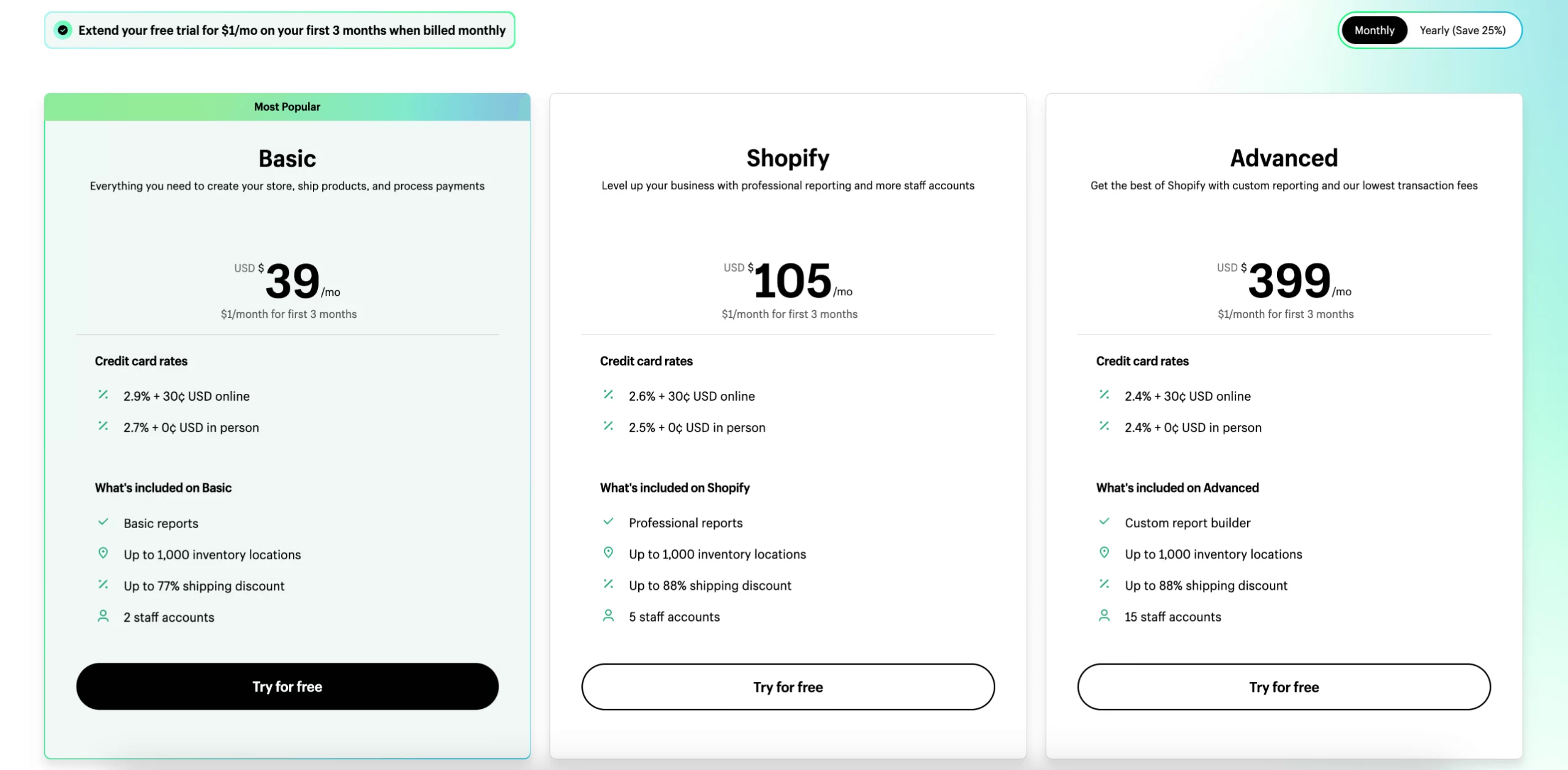
BigCommerce
On the other hand, there are four BigCommerce pricing plans available: Standard, Plus, Pro, and Enterprise. The Standard plan starts at $29.95 per month, Plus is priced at $79.95 per month, and Pro is priced at $299.95 per month. The Enterprise plan is available for businesses that need custom pricing and solutions. BigCommerce does not charge any transaction fees, but has defined sales thresholds for each pricing plan. BigCommerce can be tried for free for 15 days.
You can also get 10% off the subscription price when you pay annually for the BigCommerce Plus and BigCommerce Pro plans.
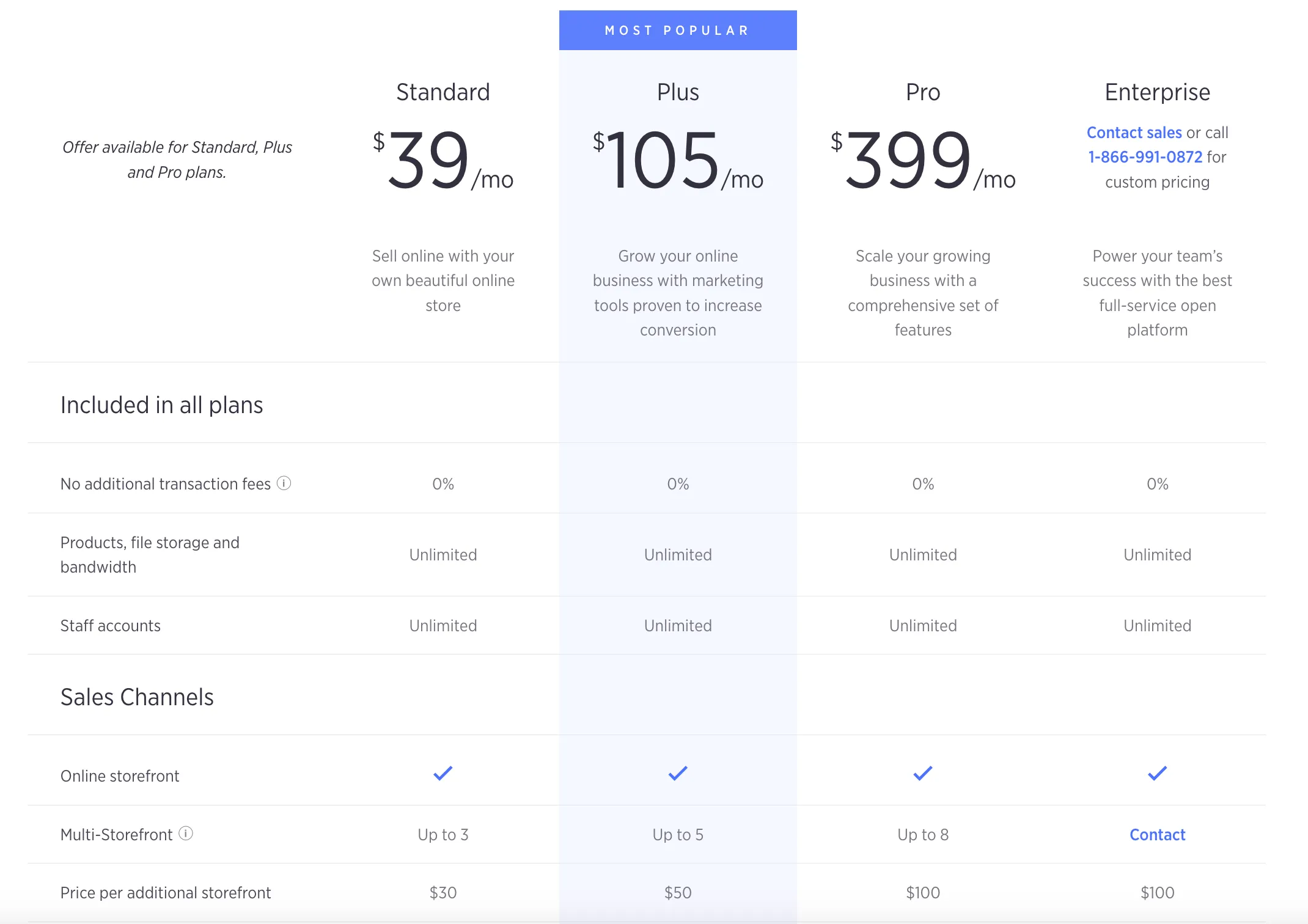
WooCommerce
Unlike the two above platforms, WooCommerce is a free open-source plugin for WordPress that requires no monthly subscription fee. However, users will need to pay for web hosting, domain name, and SSL certificate. Additionally, there are several paid extensions and themes available on WooCommerce marketplace to enhance the functionality and design of the online store.
Shopify vs BigCommerce vs WooCommerce – Final verdict for pricing: WooCommerce can be a more cost-effective option for businesses with a smaller budget and are comfortable with managing their own website and hosting. For new merchants who are looking for a hosted-source solution, Shopify will have the best value for money.
3. Design and customization
In this comparison of Shopify vs BigCommerce vs WooCommerce, all 3 platforms offer various design options to make your online store visually appealing and stay true to your branding.
Shopify
Shopify provides an intuitive drag-and-drop interface, allowing users to create professional-looking websites with no coding experience needed. Moreover, there are hundreds of free and paid Shopify themes that are mobile responsive and HTML/CSS customizable. For even further customization, Shopify has a built-in editor called Shopify Liquid that allows developers to customize the design of their online store in any way they choose.

BigCommerce
For store designing assistance, BigCommerce also offers a drag-and-drop interface and a range of mobile-responsive BigCommerce templates. They also come with customizable product options, giving users more flexibility to design their website. Thus, BigCommerce users can customize their website’s design with ease, or can even use HTML and CSS to make further changes.
Moreover, with BigCommerce Stencil – the current BigCommerce theme engine, you can further adjust your website to your unique branding requirements.
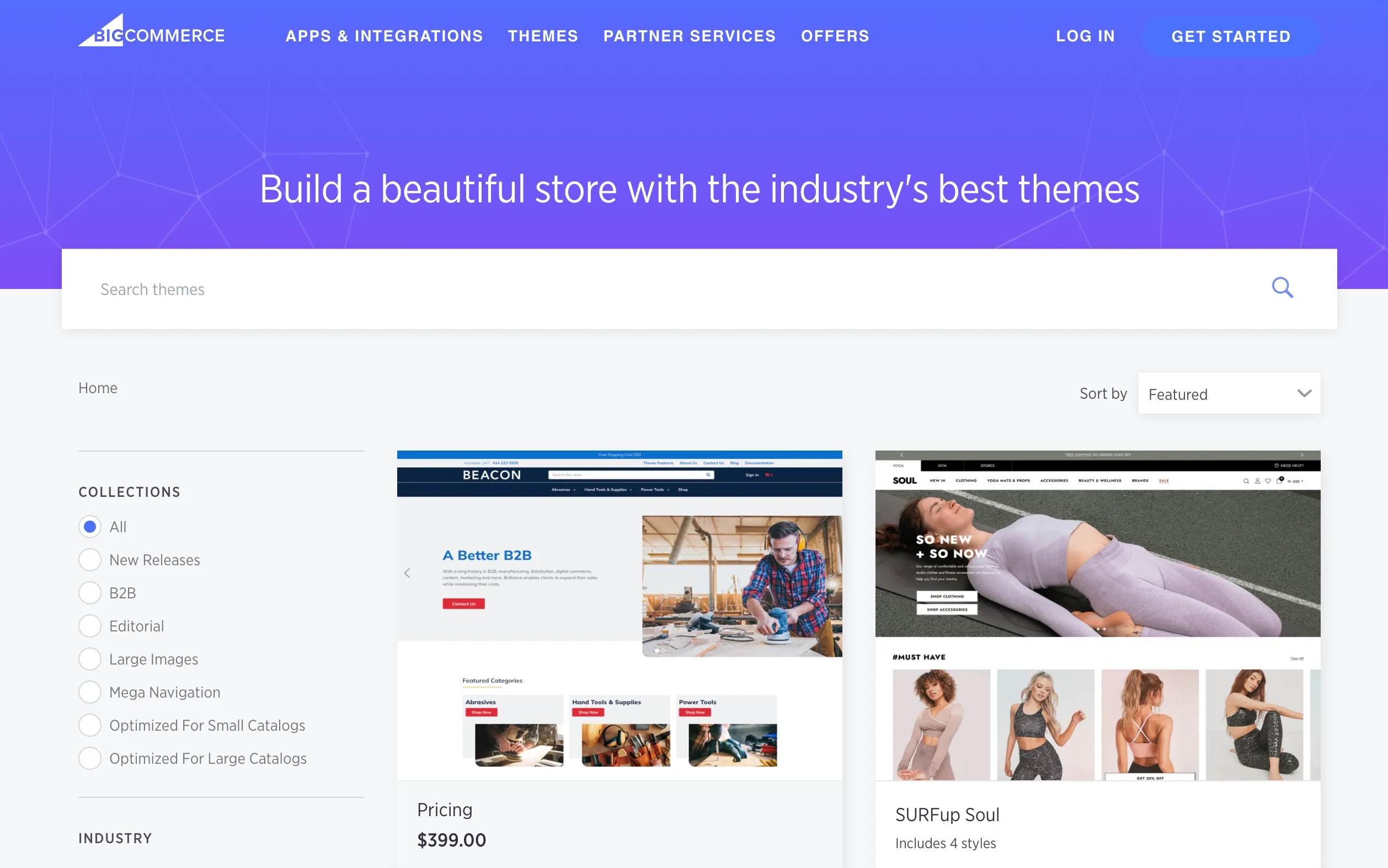
WooCommerce
WooCommerce is a WordPress plugin, so users can take advantage of the WordPress dashboard for design and customization. Users can choose from a wide selection of free and paid WordPress themes. Other than that, you can find third-party WooCommerce themes from theme marketplaces such as Themeforest.
While WooCommerce may not offer as many ready-made templates as Shopify or BigCommerce, it provides a wide range of plugins and integrations to further enhance your website’s design.
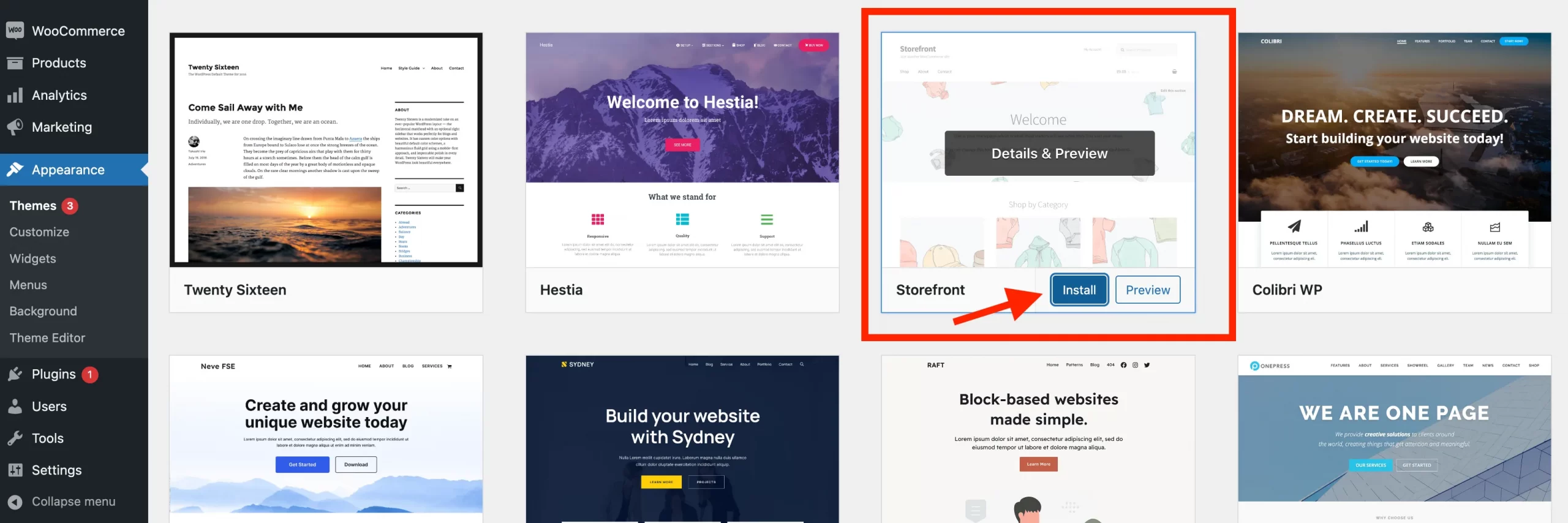
Shopify vs BigCommerce vs WooCommerce – Final verdict for design and customization: In terms of design, Shopify and BigCommerce may be more user-friendly for those with no coding experience. Even though they are hosted platforms, these websites still offer high customization ability. WooCommerce will provide the most flexibility for developers to create a highly customized design, as it is an open-cart solution.
4. Apps and integrations
Shopify
Shopify provides users with a robust Shopify app store with over 6,000 apps that can help you add features like abandoned cart recovery, email marketing, and social media integration to your store. Most of these apps are paid, but there are also plenty of free options available.
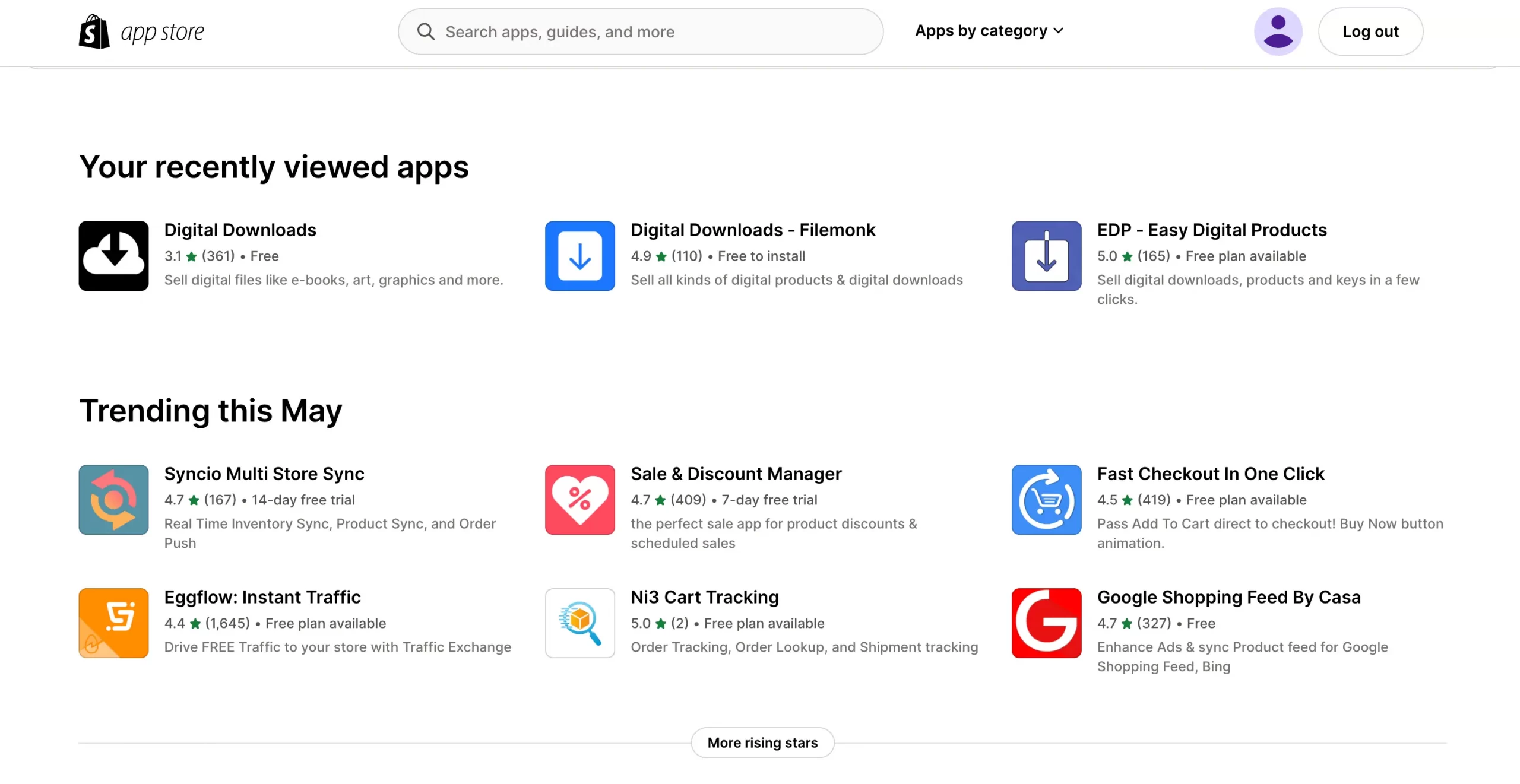
BigCommerce
BigCommerce also has a vast app marketplace, with over 800 apps on the BigCommerce app store that can be easily installed to help you enhance your store’s capabilities. These apps can add everything from shipping and tax calculations to marketing and sales tools.
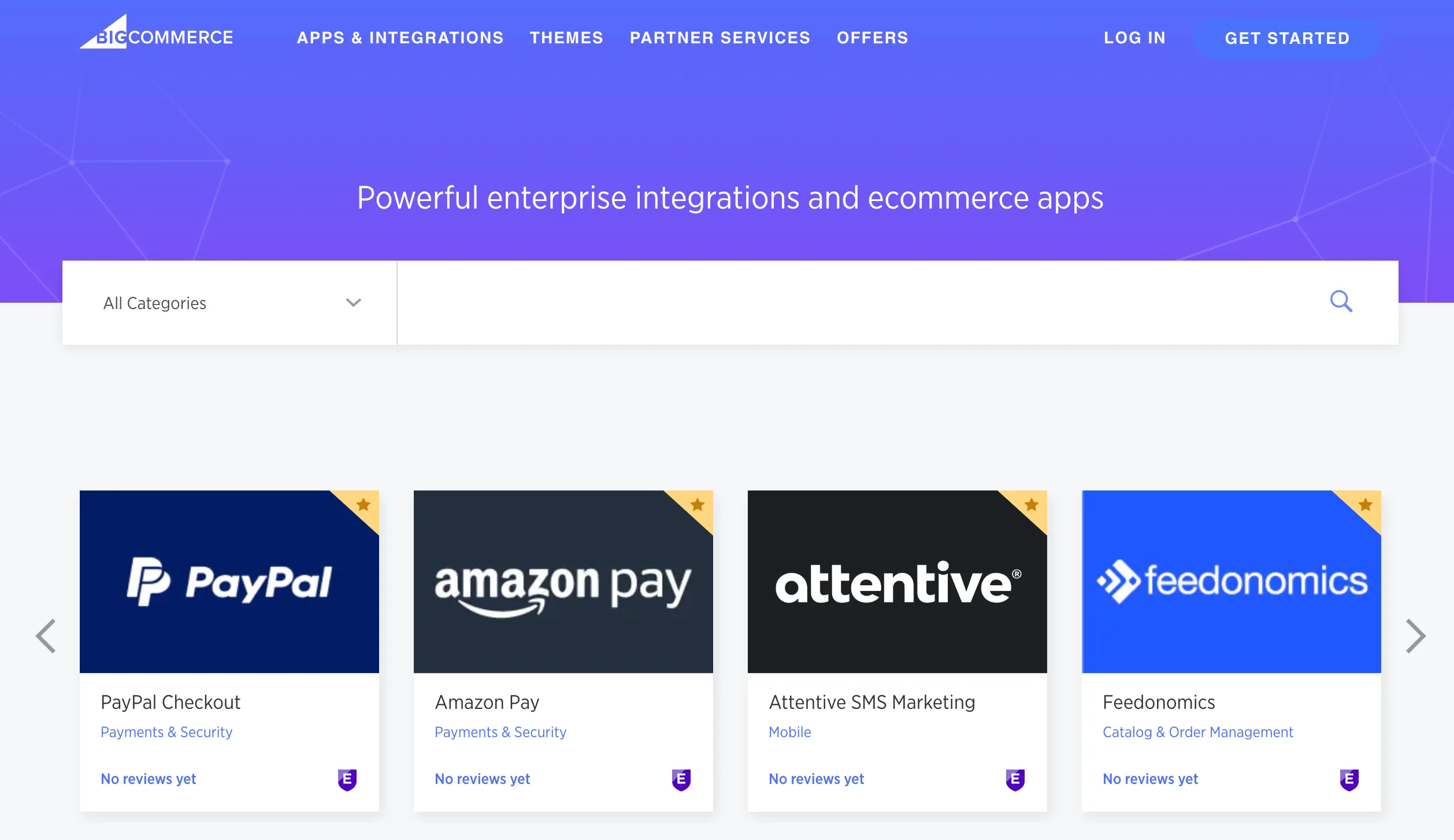
WooCommerce
WooCommerce – being an open-source platform – offers thousands of free and paid extensions. There are several separate WooCommerce extensions that can help you customize your store’s functionality, like product add-ons and custom checkout fields. With its seamless integration with WordPress, you have access to over 55,000 plugins available in the WordPress plugin directory.
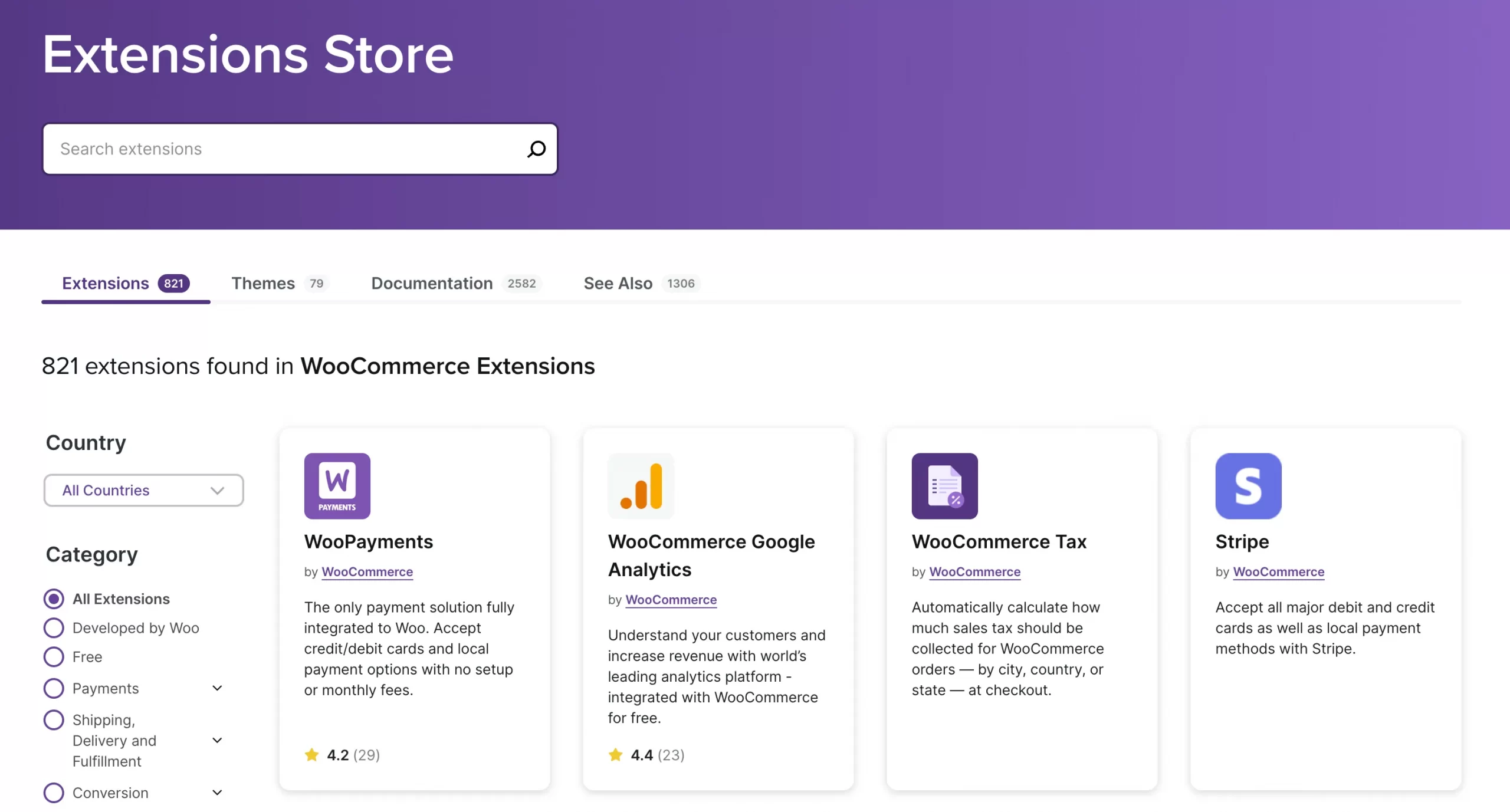
In terms of third-party integrations, all three platforms support integrations with major marketplaces like Amazon and eBay, as well as popular social media platforms like Facebook and Instagram.
Shopify vs BigCommerce vs WooCommerce – Final verdict for apps and integrations: In terms of apps and plugins, it’s clear that WooCommerce is the leading platform in app diversity and plugin quantity. But in terms of integration, Shopify and BigCommerce tend to have more native integrations with third-party tools, while WooCommerce relies more heavily on plugins for these integrations.
5. eCommerce functions
Shopify
Shopify offers an all-in-one solution that includes everything you need to start and grow your eCommerce business. You can efficiently manage your inventory, process payments, handle shipping, and track sales all from the same dashboard. At the same time, Shopify lets you integrate and sell on a wide range of sales channels, including social media and marketplaces, to help you reach more potential customers.
Other notable Shopify eCommerce functions worth mentioning include: Shopify POS integration, Shopify shipping, multiple currencies support, multichannel selling integration and Shopify Buy Button.

BigCommerce
BigCommerce also provides a comprehensive set of built-in eCommerce features, such as product management, order processing, and built-in payment gateways. One standout feature of BigCommerce is that it can easily integrate with popular shipping carriers like USPS, UPS, and FedEx, making it easy to manage your shipping and fulfillment process. BigCommerce eCommerce functions will help you optimize your online store for search engines and to personalize the shopping experience for your customers.
WooCommerce
One advantage of WooCommerce eCommerce functions is that they are highly customizable, allowing you to tailor your online store to meet your specific needs. You can add as many functionalities as you need, including product management, payment processing, and shipping options. However, unlike Shopify and BigCommerce, you will need to have some technical knowledge to set up and manage these features.
Shopify and BigCommerce offer a range of payment gateways to choose from, including popular options like PayPal and Stripe. WooCommerce also offers a variety of payment gateways, but you’ll need to set these up yourself or rely on third-party developers to do it for you.
Shopify vs BigCommerce vs WooCommerce – Final verdict for eCommerce functions: Shopify and BigCommerce offer more advanced features like abandoned cart recovery, discount codes, and gift cards. WooCommerce has a vast array of plugins available for advanced features, but again, these require more technical knowledge to set up and can be pricey as you scale up and your store needs more functions.
6. Security
When it comes to eCommerce security, all three platforms provide users with robust measures to protect their store and customer data.
Shopify, BigCommerce, and WooCommerce all have SSL encryption, which is crucial for securing customer transactions and data.
- Shopify offers level 1 PCI compliant, as well as fraud analysis tools that automatically flag and block suspicious orders.
- BigCommerce also has a secure checkout process and is PCI compliant, meaning it meets the strict industry standards for secure payment processing.

- WooCommerce also has robust security measures, such as two-factor authentication and regular security updates.
However, because WooCommerce is a plugin for WordPress, the security of your store also depends on the security of your WordPress site.
Shopify vs BigCommerce vs WooCommerce – Final verdict for security: Overall, all three platforms take security seriously.
7. Customer support
When it comes to this aspect, Shopify customer support, BigCommerce customer support, and WooCommerce customer support all offer 24/7 assistance via phone, email, and live chat.

For further help, Shopify has a dedicated support team for its Plus customers, while WooCommerce has a large online community forum where users can find answers to their questions. BigCommerce, on the other hand, has a comprehensive knowledge base and support center, including articles, videos, and webinars.

Shopify vs BigCommerce vs WooCommerce – Final verdict for customer support: In terms of customer satisfaction, Shopify and WooCommerce have received high ratings for their support, with many users praising their prompt and helpful responses. BigCommerce has also been rated highly for its support, but some users have reported longer wait times and difficulties in getting their issues resolved.
Want to expand your search besides Shopify vs BigCommerce vs WooCommerce? Here is a list of alternative platforms for you to refer to.
- Shopify Alternatives – 16+ Free & Paid Options
- BigCommerce Alternatives – 7 Names to Consider
- WooCommerce Alternatives – 9 Best Top Choices
Shopify vs BigCommerce vs WooCommerce: FAQs
[sp_easyaccordion id=”70252″]
Final Words
In the battle between Shopify vs BigCommerce vs WooCommerce, all 3 platforms are all excellent solutions for building an online store. However, each comes with its own strengths and weaknesses.
- Shopify is the best option for beginners and those looking for a user-friendly interface.
- BigCommerce offers a more complex platform with advanced features.
- WooCommerce is the best option for those with technical knowledge and looking for a platform with the most flexible customization options.
Ultimately, the best platform for your business will depend on your specific needs and preferences. Therefore, you should make a decision based on which platform is the best-suited solution to your eCommerce and branding requirements.
In case you want to migrate your current store to BigCommerce, WooCommerce, or Shopify, LitExtension – #1 Shopping Cart Migration Expert, is always willing to help. Don’t forget to visit LitExtension blog and our eCommerce community for more insights.